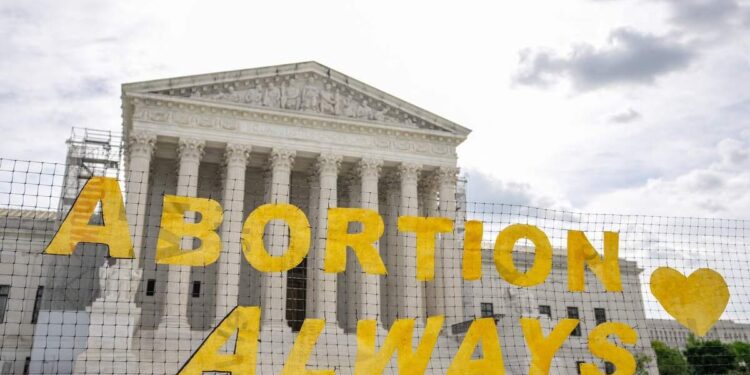The conservative-majority US Supreme Court on Thursday granted relief to supporters of abortion rights by reauthorizing it in the state of Idaho in cases of medical emergencies, without satisfying them on the merits.
• Read also: Abortion: Idaho’s ultra-restrictive law before the US Supreme Court
• Read also: In the United States, nearly 65,000 women were raped and forced to give birth
• Read also: White House slams ‘extreme’ laws banning abortion in four new states
Democratic President Joe Biden, who has positioned himself as a champion of women’s rights against his Republican predecessor and November election opponent Donald Trump, welcomed a decision that restores access to elective abortions in Idaho hospitals in cases of medical emergencies.
“No woman should be denied care, forced to wait until she is in mortal danger, or flee her state simply to receive the care she needs,” but that is the consequence of the landmark ruling by the Supreme Court striking down the federal guarantee of the right to abortion, he stressed in a press release.
By this decision of June 2022, the highest American court gave states full latitude to legislate in this area. Since then, around twenty have banned abortion, whether carried out by medication or surgery, or have strictly regulated it.
Among them, rural, conservative Idaho (northwest) allows only rare exceptions, such as in cases of incest or imminent danger to the pregnant woman’s life. Outside of these frameworks, anyone performing an abortion risks up to five years in prison.
But in August 2022 a federal judge, seized by the Biden administration, partially blocked the application of this ban because it contradicted a federal law on medical emergencies.
The federal law, called EMTALA, requires hospitals affiliated with the government’s Medicare health insurance plan — which is the majority of them — to treat anyone with a medical emergency.
But in January, the Supreme Court suspended the first instance decision while it ruled on the merits, therefore restoring the ban on abortion in Idaho in its full application.
After hearing arguments from both sides in April, a majority of the justices – three conservatives and two progressives – found that the Court had “improperly granted” the appeal, lifted the stay of the lower court’s decision, and sent the case back to the lower courts.
“Idaho’s arguments on EMTALA do not and have never justified either an emergency appeal or our early referral of this litigation,” wrote liberal Justice Elena Kagan.
This decision “will therefore prevent Idaho from applying its ban on abortion when the termination of the pregnancy is necessary to prevent serious harm to a woman’s health,” she specifies.
Conservative Justice Amy Coney Barrett agreed, calling the court’s decision to take up the case at this stage “a miscalculation, because the positions of the parties are still evolving.”
“We are relieved at the moment, but not really euphoric,” reacted the president of the Center for Reproductive Rights, Nancy Northup, deploring that the Court did not rule on the merits and for the the whole country.
“Pregnant women suffering from serious complications and the hospital staff who care for them need clarity now,” she added in a statement.
It echoes the disagreement expressed by Judge Ketanji Brown Jackson who insisted on Thursday morning solemnly reading it in session. “Today’s decision is not a victory for pregnant patients in Idaho, it is a delay,” she said.
“This Court had a chance to bring clarity and certainty to this tragic situation, and we blew it. As long as we refuse to proclaim what the law requires, pregnant patients in Idaho, Texas, and elsewhere will pay the price,” she said.
For their part, the three most conservative judges, in a dissent written by one of them, Samuel Alito, indicate that they would have ruled against the Biden administration and are surprised that the Court is relinquishing jurisdiction over the case.
“Apparently, the Court has simply lost the will to decide the easy, but emotional and highly politicized, issue that this case represents,” he writes.



